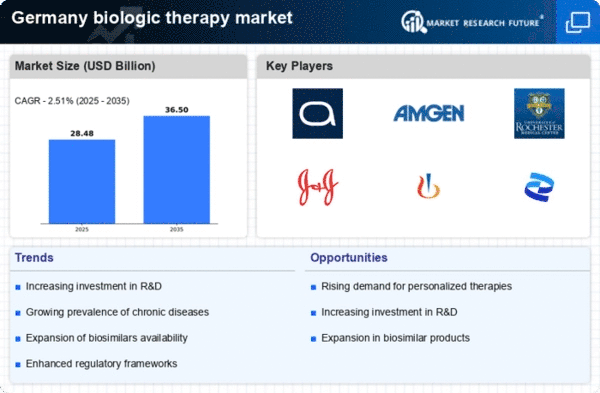Growing Aging Population
Germany's demographic shift towards an aging population is a significant driver for the biologic therapy market. As the population ages, the prevalence of age-related diseases, such as osteoarthritis and certain cancers, is expected to rise. By 2030, it is projected that over 25% of the German population will be over 65 years old. This demographic trend creates a heightened demand for biologic therapies, which are often more suitable for older patients due to their targeted mechanisms of action. Consequently, the biologic therapy market is likely to experience robust growth as healthcare systems adapt to meet the needs of this aging demographic.
Advancements in Biotechnology
Technological advancements in biotechnology are transforming the landscape of the biologic therapy market. Innovations in genetic engineering, monoclonal antibody production, and cell therapy are enhancing the efficacy and safety profiles of biologic treatments. In Germany, the biotechnology sector has seen substantial growth, with investments reaching over €3 billion in recent years. This influx of capital is fostering research and development initiatives that are crucial for the advancement of biologic therapies. As new therapies emerge from these innovations, the biologic therapy market is poised for expansion, offering patients more effective treatment options and healthcare providers a broader range of therapies to consider.
Increased Healthcare Expenditure
The increase in healthcare expenditure in Germany is a crucial factor influencing the biologic therapy market. With healthcare spending projected to reach approximately €500 billion by 2025, there is a growing emphasis on investing in advanced treatment modalities, including biologics. This increase in funding allows for greater access to innovative therapies, which are often more expensive but provide better long-term outcomes. As healthcare providers and insurers recognize the value of biologic therapies in managing chronic conditions, the market is expected to expand, driven by increased investment in these advanced treatment options.
Enhanced Patient Awareness and Education
Enhanced patient awareness and education regarding treatment options are driving growth in the biologic therapy market. As patients become more informed about their health conditions and available therapies, there is a noticeable shift towards seeking out biologic treatments. Educational initiatives and advocacy groups in Germany are playing a vital role in disseminating information about the benefits and risks associated with biologic therapies. This increased awareness is likely to lead to higher demand for these treatments, as patients actively engage in discussions with healthcare providers about their options. Consequently, the biologic therapy market is expected to benefit from this trend, as more patients opt for targeted therapies.
Increasing Prevalence of Chronic Diseases
The rising incidence of chronic diseases in Germany is a pivotal driver for the biologic therapy market. Conditions such as rheumatoid arthritis, psoriasis, and various cancers are becoming more prevalent, necessitating advanced treatment options. According to recent health statistics, chronic diseases account for approximately 70% of all healthcare costs in the country. This trend underscores the urgent need for effective biologic therapies, which are often more targeted and have fewer side effects compared to traditional treatments. As healthcare providers seek to improve patient outcomes, the biologic therapy market is likely to expand significantly, driven by the demand for innovative solutions to manage these complex health issues.
















